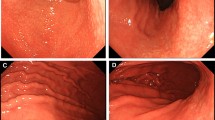Abstract
Long-term treatment with proton pump inhibitors in patients with Helicobacter pylori gastritis can lead to atrophic changes in the corpus mucosa. What is still unclear, however, is whether this atrophy can regress in response to Helicobacter pylori eradication. We report on a male patient with Helicobacter pylori gastritis receiving long-term treatment (4 years) with omeprazole for gastro-oesophageal reflux disease, who developed autoaggressive gastritis with progressive atrophy, hypochlorhydria, hypergastrinaemia and nodular ECL-cell hyperplasia. To determine whether these changes might be induced to regress, Helicobacter pylori eradication therapy was administered. Ten months after Helicobacter pylori eradication autoaggressive lymphocytic infiltrates were no longer detectable, and the glands in the corpus mucosa had normalised despite continued treatment with omeprazole – a finding that was confirmed at two further follow-up surveys performed at 6-month intervals. This case report shows that atrophy of the corpus mucosa developing under long-term treatment with a proton pump inhibitor can be cured by eradicating Helicobacter pylori.
Similar content being viewed by others
Author information
Authors and Affiliations
Additional information
Received: 21 April 1998 / Accepted: 10 August 1998
Rights and permissions
About this article
Cite this article
Stolte, M., Meining, A., Koop, H. et al. Eradication of Helicobacter pylori heals atrophic corpus gastritis caused by long-term treatment with omeprazole. Virchows Archiv 434, 91–94 (1999). https://doi.org/10.1007/s004280050310
Issue Date:
DOI: https://doi.org/10.1007/s004280050310




